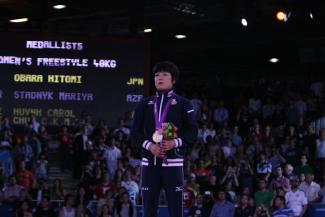What's the driving force behind Vlasov's attempt to win a third Olympic title?
Thursday, December 9, 2021 - 14:54 By Eric Olanowski
CORSIER-SUR-VEVEY, Switzerland (December 9) -- Roman VLASOV (RWF) was denied a chance to go for a third Olympic gold earlier this year, but made sure he would not miss out on his shot at winning a third world title.
Vlasov chalked up a meticulous and hard-fought 2-1 victory over ‘20 European champion Sanan SULEYMANOV (AZE) to take the 77kg at October’s World Championships in Oslo.
"I was super tired, I couldn't even celebrate as I usually do," Vlasov said. "I left all my power and energy on the mat."
Prior to the Tokyo snub, Vlasov considered ending his career. But the desire to achieve his dream of matching the legendary Alexander KARELIN (RWF) with three Olympic golds inspired him to reset his sights for the 2024 Paris Olympics. Like his hero and son’s god father, Karelin, Vlasov is a native of Novosibirsk in southwestern Siberia and was mentored by the great coach Viktor KUZNETSOV.
Oslo would be the first stop on the long road to Paris, as it would provide confirmation that he could live up to his own expectations. A world champion in 2011 and 2015, he finished out of the medals in 2017 and 2019.
"The last time I won the World Championships was in 2015, before in 2011. It’s been a long time," Vlasov said. "I missed these emotions. To be the best in the world is the thing I’ve been dreaming about. It’s the thing I think about when I wake up in the morning before going to training."
After barreling through the rounds, winning each of his four matches by at least seven points, Vlasov found a formidable foe in Suleymanov, this year's European bronze medalist and the ‘19 U23 world silver medalist.
Vlasov, a four-time European champion who turned 31 in Oslo, had the first chance in par terre, but could only get a 1-point stepout after walking the airborne Suleymanov over the edge.
But Suleymanov had no answer when the roles were reversed in the second period, and Vlasov clinched the win when he deftly evaded a stepout attempt in the final 20 seconds.
"The final match did not go as planned," Vlasov said. "I had to wrestle super hard to keep that one point scored. Patience brought the gold."
Patience and appreciation of each victory along the way are what will look to get him to the Paris Games, a lesson he learned from the Tokyo debacle.
"The last Olympic cycle I made the mistake of counting down the days to the Olympics," Vlasov said. "This time I just enjoy every title. Today I am the happiest man on Earth, tomorrow we’ll be the new day, the new qualification for the new world championships. "The Olympics are the dream of every athlete. I’ve been there twice, and I want to become a three-time Olympic champion. But it’s better not to go ahead of time."


Share your thoughts.
Comments